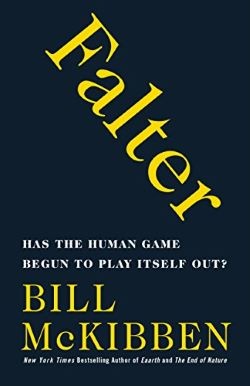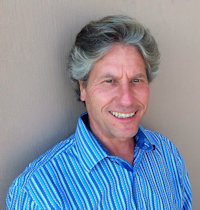Falter: Has the Human Game Begun to Play Itself Out?

from amazon.com
Thirty years ago Bill McKibben offered one of the earliest warnings about climate change. Now he broadens the warning: the entire human game, he suggests, has begun to play itself out.
Bill McKibben’s groundbreaking book The End of Nature -- issued in dozens of languages and long regarded as a classic -- was the first book to alert us to global warming. But the danger is broader than that: even as climate change shrinks the space where our civilization can exist, new technologies like artificial intelligence and robotics threaten to bleach away the variety of human experience.
Falter tells the story of these converging trends and of the ideological fervor that keeps us from bringing them under control. And then, drawing on McKibben’s experience in building 350.org, the first truly global citizens movement to combat climate change, it offers some possible ways out of the trap. We’re at a bleak moment in human history -- and we’ll either confront that bleakness or watch the civilization our forebears built slip away.
Falter is a powerful and sobering call to arms, to save not only our planet but also our humanity.
https://www.amazon.com/Falter-Human-Game-Begun-Itself-ebook/dp/B07CRJ9X7Z
Author: Bill McKibben

Bill McKibben is an author and environmentalist who in 2014 was awarded the Right Livelihood Prize, sometimes called the ‘alternative Nobel.’ His 1989 book The End of Nature is regarded as the first book for a general audience about climate change, and has appeared in 24 languages; he’s gone on to write a dozen more books. He is a founder of 350.org, the first planet-wide, grassroots climate change movement, which has organized twenty thousand rallies around the world in every country save North Korea, spearheaded the resistance to the Keystone Pipeline, and launched the fast-growing fossil fuel divestment movement.
Reviewed by: John Stokdijk

Bill McKibben begins his book Falter: Has the Human Game Begun to Play Itself Out? with an introduction entitled An Opening Note on Hope. He writes,
...I want those who pick up this volume to know that its author lives in a state of engagement, not despair.
In Chapter 1 McKibben mentions the 1972 report commissioned by the Club of Rome, The Limits to Growth. I have been aware of this report for decades, as have many. The message so succinctly captured by the title of that report should not be a surprise to anyone.
I liked this book but one little thing irritated me from start to finish. Everytime, and he did so often, McKibben used the phrase “the human game” I reacted with displeasure thinking “it’s not a game.” Of course, McKibben was not intending to trivialize the seriousness of his subject matter.
Chapter 2 begins with a statement that was uncomfortable for me to read, having lived my adult life in Alberta.
To walk the roads through even a corner of Alberta’s vast tar sands complex is to visit a kind of hell.
McKibben differentiates the ugly, serious damage to our planet caused by industrialization from the more serious existential threats of nuclear war, chlorofluorocarbons (which have been successfully mitigated) and
… the third, of course, is climate change, perhaps the greatest of all these challenges, and certainly the one about which we’ve done the least.
But throughout his book, the tone of the author is reasonable, which adds to the credibility of McKibben. He acknowledges and addresses contrary arguments. His approach seems balanced.
When economists scoffed at books such as Limits to Growth, insisting that scarcity, and the resulting higher prices, would spur the search for new sources, they had a point…
Life as we know it won’t suddenly end, but it will be crimped…
Life as we know it won’t suddenly end, but it will be crimped…
I think that McKibben is probably right to suggest, as his title Falter does, that human civilization will be seriously crimped but unlikely to completely fail, although that too is not impossible.
In Chapter 6 McKibben makes another statement that hits me, a Canadian, hard.
If a leader such as Justin Trudeau can’t manage more bravery, then what hope is there?
Chapter 9 fascinated me because it connected directly to my personal journey.
You could argue that the most important political philosopher of our time is the novelist Ayn Rand.
As a teenager I read and was strongly influenced by the books written by Ayn Rand, both The Fountainhead and Atlas Shrugged, and I read at least one of her nonfiction books. I understood and accepted much of her philosophy. But at midlife I dramatically changed my belief system, including the rejection of radical individualism, and today my values very much align with Bill McKibben.
In Chapter 13 the book takes a turn in a new direction which is not unfamiliar to me. For several years I have been paying some attention to Ray Kurzweil, a futurist and a senior executive at Google. What Kurzweil (and a few others) has to say about artificial intelligence is well worth considering.
Kurzweil has estimated that by 2020, a thousand-dollar PC will have the computing power of a human brain: twenty million billion calculations a second.
...it’s not hard to imagine how Big Data and Big Biotech will eventually combine, as Kurzweil insists, to produce a (big) new industry.
Another person that I pay some attention to is Nick Bostrom.
Why are people so scared? Let the Swedish philosopher Nick Bostrom explain. He’s hardly a Luddite. Indeed, he gave a speech in 1999 to a California convention of “transhumanists” that may mark the rhetorical high water of the entire techno-utopian movement.
As intelligence explodes, and the AI gains the ability to improve itself, it will soon outstrip our ability to control it.
In Chapter 16 McKibben yet again takes a turn in a direction of great interest to me, the meaning of life.
So, here’s what begins to worry me: with the new technologies we’re developing, it’s remarkably easy to wash that meaning right out of something even as peripheral as sports.
...perhaps we should think long and hard about more important kinds of meaning. The human game, after all, requires us to be human.
In Chapter 19, the first chapter of Part Four, McKibben makes an important statement that lacks the emphasis it deserves but is very relevant to climate change.
I don’t know— no one knows— if it is still possible to fundamentally alter our trajectory.
Bill McKibben does not know the future. John Stokdijk does not know the future. No one knows the future. There are no objective facts about the future. Yet what is more important than the future, our future, earth’s future?
There are many comments I could make about the excellent thoughts in this book but I will confine myself to only one more.
When far more young people tell pollsters that they identify with socialism more than with capitalism, they don’t mean they want to live in North Korea; they mean they want a fair chance, not the loaded system they’ve inherited.
More and more people, especially the young, are questioning capitalism and rightly so. It may not be possible to mitigate the impact of global warming without replacing our capitalistic system. Few thinkers are wrapping their minds around the magnitude of such systemic change.
And finally, on any complex topic, it is always worthwhile, but not easy, to consider contrary opinion. Below is a link to an article worth reading and thinking about. Who has the truth?
‘There Is No Climate Emergency’: Scientists Call for Reasoned Debate
Remember: no one knows… no one knows… no one knows!!!
Comments
6 years ago — John StokdijkHello From the Year 2050. We Avoided the Worst of Climate Change — But Everything Is Different
This is a great recent article by Bill McKibben.
6 years ago — John Stokdijk
6 years ago — John StokdijkDear Rep. Ocasio-Cortez, Please Work to End War
As other activists point out, defense cutbacks could help pay for the Green New Deal, your exciting program for countering global warming and other threats to the environment.
